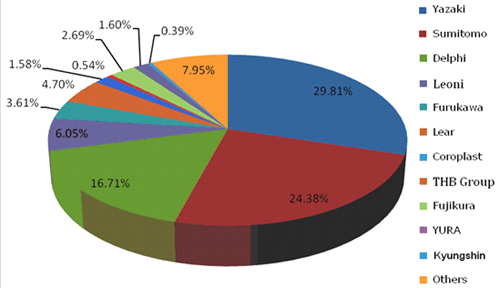|
Automotive wiring harness is called the "vessel" of a car, and it is often considered as the central nervous system of a vehicle, combining in-car computer with auto related functions. Wiring harness has become an important indicator that evaluates the performance of a car.
In H2 2008, the number of orders obtained by automobile manufacturers shrunk dramatically. In 2009, optimistic expectation and strong Chinese market made automakers get more orders. As the increasing electronics get applied to the automobile, and the population of hybrid vehicles increases, automotive wiring harness market grows steadily, and it is expected that the market will value US$32 billion in 2012.
Market Shares of World’s Major Manufacturers of Automotive Wiring Harness, 2009

Global automotive wiring harness market is monopolized by large manufacturers, the top four of which hold more than 75% market shares. All the manufacturers except Delphi are Japanese enterprises. The manufacturers of automotive wiring harness must have production experience and cost control ability. Yazaki, Sumitomo, Leoni, Furukawa, Fujikura, Coroplast and Kyungshin are the manufacturers starting from wire and cable business. Most of these manufacturers own upstream mining resources. Sumitomo and Furukawa have their own copper mines and they do quite well in cost control. Traditional auto parts makers do not have many advantages in wire harness, so Valeo sold wiring harness business to Leoni.
Secondly, the manufacturers of automotive wiring harness should have technical expertise in automotive connectors. Fujikura boasts of the state-of-the-art connector technologies; so do Yazaki and Sumitomo.
In addition, the manufacturers of automotive wiring harness should cooperate exceedingly well with automakers since the quality and stability of wire harness are crucial, therefore, automakers can not change suppliers randomly after they choose a certain one. Besides, the design of auto harness associates with electronics, mechanics, thermal distribution and other factors. In such a context, the design must be synergized by automotive wiring harness manufacturers and automobile manufacturers, but it is difficult for small manufacturers to do so. Automotive wiring harness need to be improved through continuous testing. Both of Delphi and Lear have benefited from their good relationship with automakers for many years.
In wiring harness industry, labor cost takes a large proportion of total cost. The industry tends to transfer to China.
Ranking by Revenue of Automotive Wiring Harness Manufacturers Worldwide, 2009
|
|
Revenue in 2009 (US$ M) |
|
Yazaki |
7,548 |
|
Sumitomo |
6,172 |
|
Delphi |
4,230 |
|
Leoni |
1,531 |
|
Furukawa |
914 |
|
Lear |
1,190 |
|
Coroplast |
400 |
|
THB Group |
136 |
|
Fujikura |
682 |
|
YURA |
404 |
|
Kyungshin |
98 |
|
Others |
2,012 |
In China, Japanese automotive wiring harness companies hold 60% market shares, followed by the three Korean counterparts, YURA, Kyungshin and Yu Jin accounting for a total share of about 15%. In 2009, 42 manufacturers achieved the sales value of more than RMB100 million apiece, but only five of them were local ones, while the rest were joint ventures or foreign manufacturers. Among Chinese manufacturers, the Hebi-based THB Group is the most excellent, followed by Kunshan Huguang, Nantong Unistar, JAC Xinfa and Brilliance Taian. JAC Xinfa and Brilliance Taian are associated with automobile manufacturers. Nantong Unistar focuses on coaches.
For more details, please visit http://www.researchinchina.com/Htmls/Report/2010/5867.html |